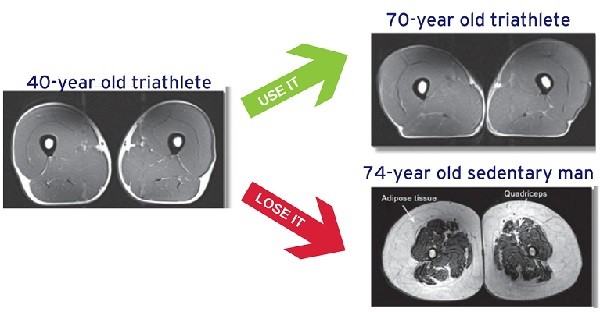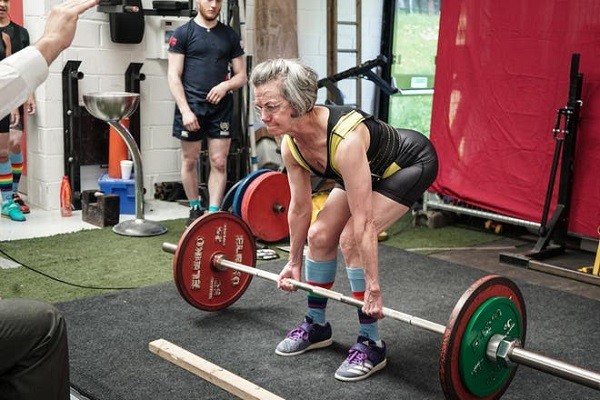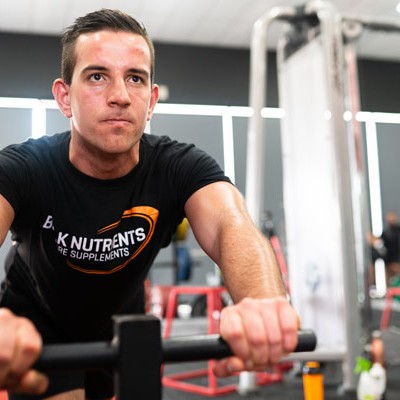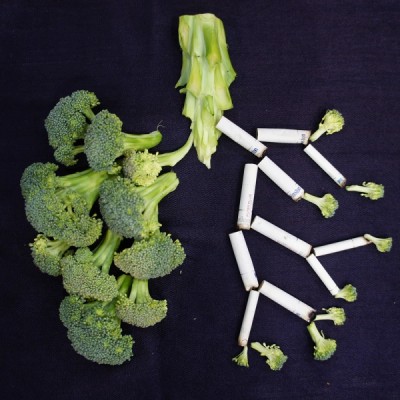Do You Lose Muscle Mass and Get Fatter as You Age?

Do we lose muscle mass and get fatter as we age?
Take a look around a public place next time. Generally, the older people are, the more out of shape some seem to be.
And this observation, and thus correlation, is what many people have come to accept as a universal truth that cannot be reversed.
So, is it?
Well, this study suggests that yes, your metabolism does slow down with ageing, and this research declares fat shifts over to your stomach.
So that's it, right? Get to a certain age and just throw in the towel, and let nature take its course on our bodies?
No chance!
Because this research wasn't done on people that exercise.
There's an old saying in science: correlation doesn't equal causation. Just because an older person gets fatter as they age, doesn't mean ageing causes fat gains.
This study tells us the majority of what we need to know about maintaining our physical activity level for our entire lives: keep training for your whole life and you'll keep the fat off.
The researchers examined world champion master athletes in their 90s and found:
"...a greater number of surviving motor units, reduced collateral reinnervation, better neuromuscular transmission stability, and a greater amount of excitable muscle mass compared with age-matched controls."
In other words, they didn't experience the reversals in muscle mass and functionality as they didn't stop training as they got older.
At what age does muscle loss start?
This shouldn't scare you as much as it should motivate you; we start losing muscle at the rate of 3-8% per decade after the age of 30.
The point is if we keep training, we won't lose it.
In this study, a cross-section of forty high-level recreational athletes aged 40 to 81 years trained 4 to 5 times per week. They underwent tests of health/activity, body composition, and quadriceps power tests.
The researchers tested their fat and muscle mass, to get a snapshot of the truth. Amongst the findings, quadriceps peak torque didn't decline with age! Nor did strength. The researchers write:
"This study contradicts the common observation that muscle mass and strength decline as a function of ageing alone. Instead, these declines may signal the effect of chronic disuse rather than muscle ageing."
The image below derived from the study presents a very clear vision of the study results:

We can see how the leg of a 70-year-old triathlete is the same as a young man in his 40s. Yet, when we give up being active altogether, as the 74-year-old sedentary man example, we lose muscle mass and gain fat.
The authors noted that whilst you can keep your muscle gains as you age with continuous exercise, you will also maintain function!
“This maintenance of muscle mass and strength may decrease or eliminate the falls, functional decline, and loss of independence that are commonly seen in ageing adults.”
That's a pretty good reason to keep exercising!
Training for longevity regardless of age
Further research has cemented how men in their 80s can still be active:
“Despite the inevitable changes that occur in muscle structure and function with ageing, the elderly highly trained and highly-skilled elite athlete is still able to compete into his eighties in a wide variety of sports activities at a level unattainable by less gifted and less well-trained young people.”
In other words, if you keep training, in your 80s you may be able to compete with people in their 40s or 50s simply by staying consistent with your training.
There's no doubt that all of us will experience the ageing process in some form. But the findings here indicate that we must keep up the training unless there's a serious reason not to do so.

Yes, gaining muscle can become harder. But if we keep turning up, we can keep a lot of the muscle gains we've made.
But it's a mindset: ignore ageing and keep training at a respectable level and you'll age particularly well!
Just keep showing up!
The bottom line is that whilst we can lose muscle mass and get fatter as we age (muscle loss begins in our 30s) it won't happen if we keep training consistently. Athletes in their 90s still have a large number of surviving muscle units and muscle mass. The quadriceps of a 40-year-old triathlete and a 70-year-old is basically the same in terms of muscle mass and fat if training is kept up.
Moreover, keeping up the training as we age will also protect us from falls and loss of functionality as we age. Athletes in their 80s who have kept up the training their whole lives can usurp younger competitors who are less gifted and less trained.
If we keep training consistently in our lives, we're likely to reverse the loss of muscle mass and the accumulation of fat that comes as we age.

Dayne Hudson
Like many, Dayne was once desperate to lose weight and get into shape. But everyone he asked, everything he read, lead to the same place... nowhere.
His journey started there - researching science journals and completing a Sports Nutrition Specialist qualification so he could make weight loss easier.
References:
- Faulkner JA, Davis CS, Mendias CL, Brooks SV. The aging of elite male athletes: age-related changes in performance and skeletal muscle structure and function. Clin J Sport Med. 2008;18(6):501-7.
- Holloszy JO. The biology of aging. Mayo Clin Proc. 2000;75 (Suppl):S3–S8.
- Hunter GR, Gower BA, Kane BL. Age Related Shift in Visceral Fat. Int J Body Compos Res. 2010;8(3):103-108
- Lamberts SW, van den Beld AW, van der Lely AJ. The endocrinology of aging. Science. 1997;278:419–424.
- Melton LJ, III, Khosla S, Crowson CS, et al. Epidemiology of sarcopenia. J Am Geriatr Soc. 2000;48:625–630.
- Power GA, Allen MD, Gilmore KJ, et al. Motor unit number and transmission stability in octogenarian world class athletes: Can age-related deficits be outrun?. J Appl Physiol (1985). 2016;121(4):1013-1020. doi:10.1152/japplphysiol.00149.2016
- St-onge MP, Gallagher D. Body composition changes with aging: the cause or the result of alterations in metabolic rate and macronutrient oxidation?. Nutrition. 2010;26(2):152-5.
- Wroblewski AP, Amati F, Smiley MA, Goodpaster B, Wright V. Chronic exercise preserves lean muscle mass in masters athletes. Phys Sportsmed. 2011 Sep;39(3):172-8. doi: 10.3810/psm.2011.09.1933. PMID: 22030953.
Related Blogs

How Does Alcohol Affect My Muscle Growth Goals?
Posted by Dayne Hudson
Estimated reading time: 5 minutes

Factors That Affect Men’s Health and Turning Your Health Around
Posted by Ben Disseldorp
Estimated reading time: 10 minutes

The Benefits of Quitting Smoking
Posted by Max Cuneo
Estimated reading time: 13 minutes




























